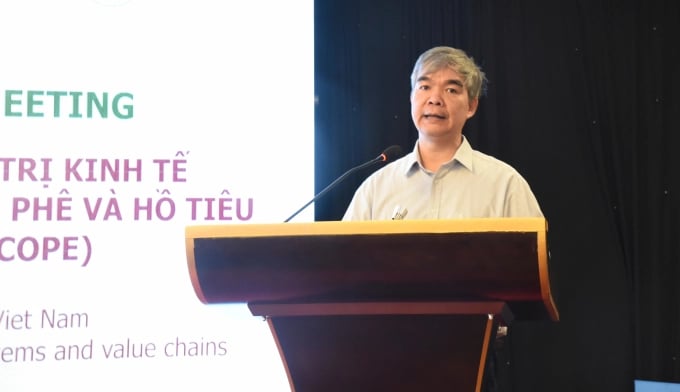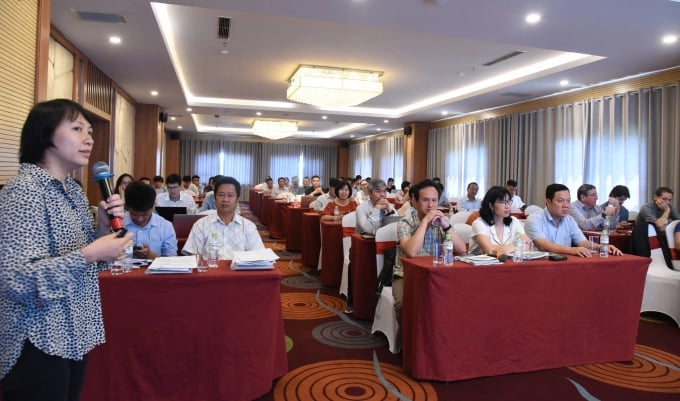November 25, 2025 | 15:30 GMT +7
November 25, 2025 | 15:30 GMT +7
Hotline: 0913.378.918
November 25, 2025 | 15:30 GMT +7
Hotline: 0913.378.918
On the morning of June 22, in Buon Ma Thuot City (Dak Lak), the initiation meeting for the Project to Improve the Sustainability, Productivity, and Economic Value of the Coffee and Pepper farming chains in the Central Highlands (V-SCOPE Project) took place.
The Australian Center for International Agricultural Research (ACIAR) implemented the project with funding from JDE Company, the World Agroforestry Centre (ICRAF) in Vietnam, and The French Agricultural Research Centre for International Development (CIRAD)...
The V-SCOPE's goal is to improve the livelihoods of smallholder farmers in the Central Highlands, especially vulnerable farmers. The project aims to achieve this by improving sustainability and the value of coffee and pepper farming chains.

Mr. Nguyen Quang Tan, the ICRAF National Coordinator stated that the project will promote sustainable agricultural practices, including methods to improve soil health in coffee and pepper farms. Photo: Quang Yen.
The project consists of four main components: Improving soil quality and controlling soil-borne pests in coffee, pepper, and nursery farms; improving sustainable farming practices with greater economic efficiency and resource use; improving service delivery and managing the chain of sustainability certification standards… to support changes in people's activities; improve capacity to implement scaling strategies and ensure long-term adoption of sustainable farming systems, implementing value chains at the landscape level based on the environmental, socio-political contexts.
Dr. Nguyen Quang Tan, the ICRAF Country Coordinator, said that one of the current problems in the Central Highlands is land degradation due to the impact of unsustainable farming practices, especially overuse. chemicals in agricultural production. “Consequently, the V-SCOPE project will test, evaluate and promote sustainable agricultural practices, including methods to improve soil health in coffee and pepper farms,” said Mr. Tan.

Dr. Nguyen Mai Phuong, the V-SCOPE Deputy Coordinator, presented at the meeting. Photo: Quang Yen.
According to Mr. Estelle Bienabe, the V-SCOPE Project Coordinator, the team of experts designed and tested a new irrigation procedure during the first year of the project. The process will be adjusted in the coming years based on data on soil water infiltration, plant transpiration, and coffee production.
The knowledge gained in this process will help to accurately model the response of coffee and pepper under different climatic conditions. Consequently, the experts could perfect a climate-adaptive smart irrigation system for coffee and pepper in the Central Highlands.
The V-SCOPE project will be implemented from February 2021 to September 2024 in three provinces of Gia Lai, Dak Lak, and Dak Nong with the participation of nearly 300 coffee and pepper farming households.
Translated by Hoang Duy

(VAN) Vinh Ha hamlet (Dai Xuyen commune, Hanoi) is shifting away from small-scale farming as households adopt bioscurity into their breeder chicken models.

(VAN) Heavy rains make aquatic species more vulnerable to disease. Proactive water management and high-tech systems help farmers prevent outbreaks and protect yields.

(VAN) Greenhouses are shifting production mindsets in Binh Lu commune, enabling farmers to ‘weather the sun and rain’ and secure stable vegetable harvests throughout the year.

(VAN) Green transition is crucial for the Mekong Delta amid climate change and stricter standards, offering a path toward sustainability.

(VAN) Dong Thap promotes agricultural restructuring, forms large specialized farming zones, raises the value of agricultural products and develops toward ecological and high-tech directions.
/2025/11/22/4018-4-213342_747.jpg)
(VAN) The Mekong Delta Agricultural Experts Club has attracted 143 experts and researchers to participate in providing consultancy and contributing initiatives to the development of one million hectares of high-quality rice.

(VAN) Ca Mau’s development of OCOP products opens a path to increasing cooperatives value, helping boost income, expand markets, and affirm collective economy's role.